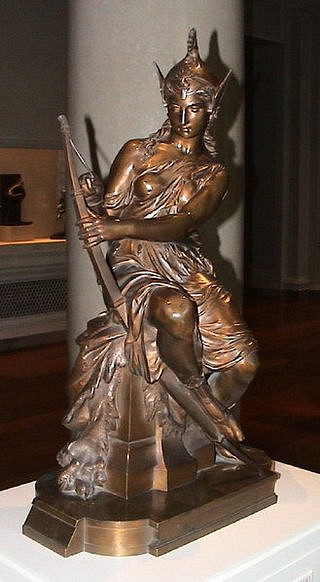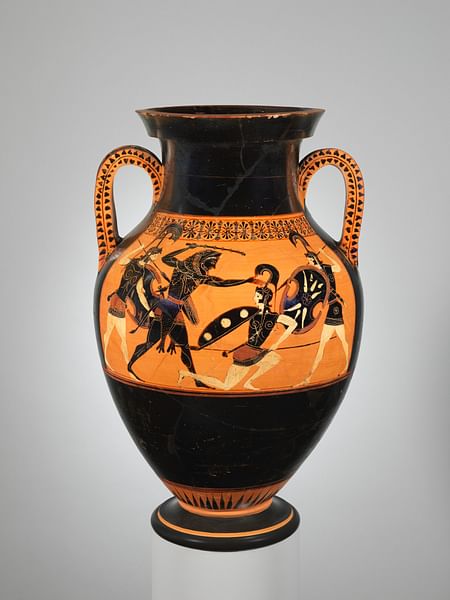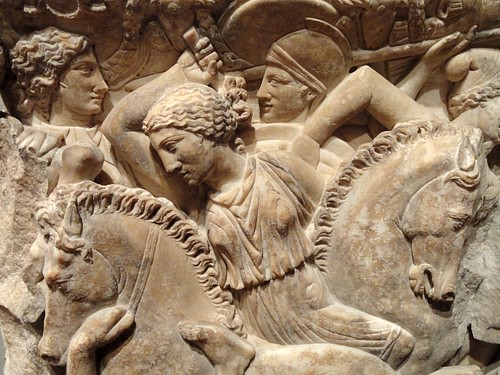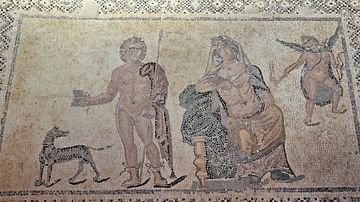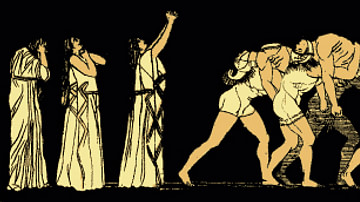
Hippolyta, or Hippolyte, was a queen of the Amazons in Greek mythology. A daughter of Ares, the Greek god of war, and Otrera, queen of the Amazons, she is a significant figure in the legends of Hercules and Theseus. In the present day, she is best known for her role in DC Comics' Wonder Woman series.
The Amazons were a nation of warlike women who dwelt in the city of Themiscyra on the Black Sea. Alongside the race of Amazons as a whole, Hippolyta was the daughter of Ares, who gifted her a magnificent girdle, which she wore as a symbol of her authority. In different variations of the Greek myths, Hippolyta is seen playing different, sometimes conflicting roles. Some stories, which place her death at the hands of Hercules during the hero's ninth labor, assign her role in Theseus' later myth to one of her sisters, Antiope or Melanippe. She has often been depicted in art from classical times to the present as a powerful female leader.
The Amazons & their Queens
The race of female warriors known as Amazons was said to have descended from Ares and the nymph Harmonia. Living on the Black Sea, which to the Greeks was at the edge of the known world, the Amazons were known for their fierce independence, as well as for their incredible abilities in the fields of hunting, riding, archery, and warfare. According to some sources, the Amazons lived close to the all-male Gargarean tribe, and the two groups would meet annually in order to procreate.
Other sources depict the two tribes as enemies, constantly at war. If a baby girl was born to an Amazon, the ancient Greeks believed that the child would be raised and taught the warlike ways of the Amazon culture, whilst a baby boy would be either killed or mutilated and discarded. The Greeks further believed that Amazons would voluntarily remove their right breast, either by burning it or cutting it off, so that they could draw their bows more easily, whilst retaining their left breasts for child-rearing. This has given rise to the belief that the word amazon itself is derived from the Greek word for "breastless", although this has been disputed by scholars.
Hippolyta was but the second of the known Amazon queens, fierce women who led their people on military campaigns and into battle. The most significant of these queens included:
- Otrera, the child of a romance between Ares and Harmonia. She was the first queen of the Amazons, mother of Hippolyta and her sisters, and the supposed founder of the Temple of Artemis in Ephesus.
- Hippolyta, the daughter of Ares and Otrera, who was gifted a girdle by her father. She would feature prominently in the myths of Hercules and Theseus.
- Penthesilea, sister of Hippolyta. One of the many different variations of Hippolyta's death has her killed by Penthesilea in an accident. Penthesilea led the Amazons to the aid of the Trojans during the Trojan War, where she was killed by Achilles, who was rumored to have been in love with her. Achilles was so vexed by the rumor that he killed his comrade who brought it up.
- Myrina, who led the Amazons on campaigns in Libya and Egypt defeating the Atlanteans and conquering much territory before being eventually defeated herself and falling in battle.
- Thalestris, the last of the known queens. According to myth, Thalestris led 300 Amazons to meet with Alexander the Great (r. 336-323 BCE), with the intention of breeding a race of warriors possessing Alexander's strength and military brilliance. She stayed with the king for 13 days and nights, hoping that she would conceive a daughter.
Ninth Labor of Hercules
Of all these queens, however, Hippolyta is the best known owing to the part she plays in famous myths. One of the stories Hippolyta is most known for is her role in the Twelve Labors of Hercules. A child of Zeus and the mortal woman Alcmene, Hercules was the greatest of all the Greek heroes. Yet, the fact that he had been born out of an illicit affair stirred the jealousy and wrath of Hera, Zeus' wife, who would constantly look for ways to try to kill, or at least torment, Hercules. The moment for her vengeance would come once Hercules married.
Hercules had married Princess Megara, and they had three sons. Never one to forget an insult, Hera struck Hercules with a fit of madness, during the course of which he killed Megara and his sons. Once they were dead, Hera allowed the madness to be lifted so Hercules could see what he had done with his own, sane eyes. Distraught, Hercules looked for some way to find atonement for his sins, leading him to Eurystheus, king of Tiryns, who would give Hercules twelve labors to complete before finding atonement. These labors ranged from slaying the nine-headed Hydra, a serpent sacred to Hera, to cleansing the stables of Augeas in a single day, which he achieved by diverting the course of a river. Although some took him longer than others to complete, Hercules finished eight labors before he met the Amazons.
For the ninth of his twelve labors, Hercules was tasked by King Eurystheus to retrieve the girdle of Ares, since Eurystheus' daughter had come to desire it. After many adventures, Hercules eventually came to Themiscyra, either alone or with companions, depending on the version of the story, to seek an audience with Hippolyta. She met with him aboard his ship and asked him to explain why he had come and why he wanted the girdle. He did so, telling her the story of his labors and the jealousy of the goddess Hera which plagued him, convincing Hippolyta to take pity on him and agree to give him the girdle.
However, Hera, whose relentless wrath was no closer to subsiding after all these years, was not about to let him complete this labor so easily. Disguising herself as an Amazon, Hera walked amongst the warrior women, spreading rumors that Hercules had not actually come to obtain the girdle as he claimed but instead planned to kidnap Hippolyta herself. Alarmed, the Amazons armed themselves and rode to Hercules' ship on horseback to free their queen. Hercules, thinking this was part of some treacherous plot by Hippolyta, slew the queen and stole the girdle from her corpse, before fighting off the Amazon hordes and sailing away. As Apollodorus describes the encounter:
When he [Heracles] put in at the harbor of Themiscyra, Hippolyte came to see him, and she asked him why he had come and promised to give him the belt. But Hera assumed the likeness of an Amazon and wandered around the crowd saying that the strangers who had just arrived were abducting the queen. Seizing their arms, the Amazons hastened to their ships on horseback; and when Heracles saw them there fully armed, he thought that this must be a result of a plot, and he killed Hippolyte and robbed her of her belt. And then, after fighting the rest of the Amazons, he sailed away, and called in at Troy. (Apollodorus, II.5)
Wife of Theseus
In some versions of the legend, Theseus had traveled with Hercules to retrieve the girdle and either abducted Antiope, the sister of Hippolyta, himself or was given her by Hercules as a spoil. Still other versions depict Theseus and Antiope falling in love with one another, with her willingly leaving her Amazon people to live with him in Athens. Yet many accounts do not name this woman as Antiope but as Hippolyta herself. No matter which sister it was that Theseus either willingly or unwillingly took to wife, most versions of the legend agree that he brought her to Athens where she bore him a son, called Hippolytus. Sometime after the birth of his son, Theseus set aside his Amazon wife to marry Phaedra, daughter of King Minos.
It was around this time that the Amazons attacked Athens in the mythical conflict known as the Attic War. The cause of their invasion also differs depending on the rendition. Some versions claim it was simply a response to the abduction of one of their own whilst others list it as an enraged reaction to Theseus setting aside Hippolyta so he could wed Phaedra instead. Whatever the case, most accounts that do not describe Hippolyta's death at the hands of Hercules, place it during the conflict between the Athenians and the Amazons.
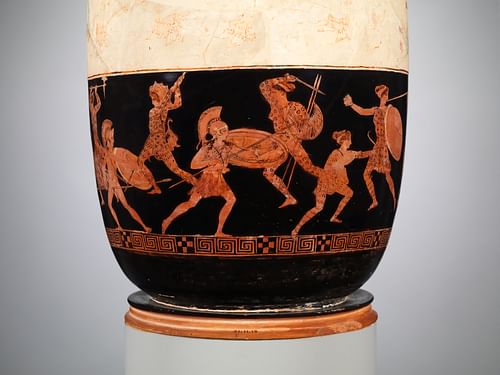
Yet even here, accounts differ as to whether Hippolyta was fighting alongside or against Theseus. For example, in his Library of Greek Mythology, Apollodorus offers that Hippolyta, spurned by Theseus' marriage to Phaedra, was the one leading the Amazons in their invasion, going so far as to crash the wedding celebrations in her anger. On the point of killing the wedding guests, the doors were quickly closed, trapping her inside and away from her army, at which point she was killed. Apollodorus offers another alternative that Theseus killed her in the midst of battle. Apollodorus summarizes the Amazon's entire marriage to Theseus as such:
Theseus accompanied Heracles on his expedition against the Amazons, and he abducted Antiope, or according to some Melanippe, or according to some Hippolyte. It was for that reason that the Amazons marched against Athens and after they had pitched camp by the Areiopagos, they were defeated by Theseus and the Athenians. Although he had a son, Hippolytos, by the Amazon, he afterwards accepted Phaedra, daughter of Minos, as a wife from Deucalion, putting an end to their previous hostility. During the wedding celebrations, the Amazon who had been formerly married to him arrived fully armed with her fellow Amazons, and was on the point of killing the guests; but they closed the doors with all speed, and killed her. Or, according to some, she was killed in battle by Theseus. (Apollodorus, Epitome 1)
Plutarch, in his Life of Theseus, doubts this version of events, suggesting that Theseus only married Phaedra once Hippolyta/Antiope had already died. Plutarch tells of how in the battle, Hippolyta was killed by a javelin thrown by Molpadia whilst fighting by Theseus' side. Still other versions claim that she was killed accidentally by her sister Penthesilea. Either way, she is not present in the legend of Theseus following the battle with the Amazons.
In Art, Literature, & Popular Culture
Due to her role in both the Labors of Hercules and the Attic War, Hippolyta is featured on numerous Greek artworks depicting Amazonomachies, or battles with Amazons.
Also noteworthy is her appearance in William Shakespeare's comedy, A Midsummer Night's Dream, where she is depicted as planning her wedding ceremonies to Theseus, the duke of Athens. In Shakespeare's version, Theseus has abducted Hippolyta from a battlefield, and as the play opens, he is eagerly awaiting his wedding day to her. As he says in the opening act: "Hippolyta, I woo'd thee with my sword, and won thy love, doing thee injuries; But I will wed thee in another key, with pomp, with triumph, with revelry." (Act I, Scene I). Like many of his plays, Shakespeare's inspiration for his version of Hippolyta came from Plutarch.
Hippolyta is perhaps best-known today for her portrayal in DC Comics' Wonder Woman series, as Queen of the Amazons and Wonder Woman's mother. In the comic series, she is 3,000 years old and resides in Themiscyra, which is isolated from the rest of mankind. She is very protective of her daughter, Diana, forbidding her to take part in the tournament to decide which Amazon can leave the island and become Wonder Woman. Diana participates in the tournament in disguise and wins. Hippolyta reluctantly agrees to let her leave and assume the role. She mostly remains in Themiscyra throughout the series, although at one point she assumes the role of Wonder Woman herself for a short time.
Her character was first introduced in the original Wonder Woman comics in the early 1940s. When the popular live-action Wonder Woman television show premiered in 1975, the character was first played by Cloris Leachman, who portrayed Hippolyta as loving, authoritative, and judgmental towards Man's World. Leachman would play the role only for the first episode, and the character was afterwards portrayed by Carolyn Jones and Beatrice Straight respectively. Most recently, Queen Hippolyta has been played by Connie Nelson in the DC cinematic universe. Both the version of Hippolyta in the comics and her appearances on live-action and animated TV have allowed her to become known as a strong and caring yet determined leader.
Conclusion
Queen Hippolyta, although playing relatively minor roles in the larger myths of great Greek heroes, has still managed to make an impact. As a legendary Amazon queen, her presence has persisted through Greek art, as a Shakespeare character, and in modern popular culture as the mother of Wonder Woman. Whether in the original myths themselves or in the modern day, Hippolyta is often thought of as a powerful female leader who, although dying many times in many different stories, refuses to be forgotten.

